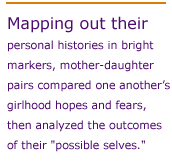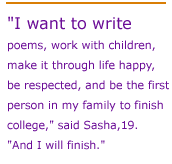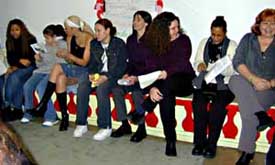HOLYOKE, MA—To an outsider, the gathering might have seemed like any neighborhood party in this working-class city of Holyoke, Massachusetts. Mothers and daughters bustled about the kitchen, cooking up the pasteles traditionally served at feasts in Puerto Rican communities. Over platefuls of rice and beans, they traded stories of growing up poor, of early marriage and its hardships, of the mothers’ hopes and realities, the daughters’ dreams and fears.
Only it wasn’t just a party. These women and teenaged girls — almost none of whom had ever set foot inside a college classroom — were participating in serious sociological research. The subjects? Themselves. The experts? Not the usual professors from this university-studded Massachusetts valley, but the women themselves, who together had taken the reins to investigate the meaning of their own lives.
Mapping out their personal histories in bright markers on large chart paper, 20 mother-daughter pairs compared one another’s girlhood hopes and fears, then analyzed the outcomes of their “possible selves.”
As teenagers, “we both wanted to travel” said Jenny Whitley, who acts as mother to her niece Jessica Robles, 19. “I wanted to be a pilot when I was younger, now she wants to be a stewardess. And she still has a chance for that!”
Without the restrictions her aunt experienced in a male-dominated Puerto Rican girlhood, Jessica says she has far more privacy, more knowledge, more open communication with her family — and more options for her future. Yet she looks to Jenny for inspiration nonetheless.
Researchers Were Their Own Subjects
Even in the most innovative investigations, subjects themselves rarely act as their own researchers. That idea came from Lori A. Lobenstine, the director of teen programs at Girls Incorporated, who started the Possible Selves project with Yasmin M. Pereira of the Springfield-based Spanish-American Union. Along with Daisy Jimenez, who directs the local Teen Resource Project, they recruited girls to help design and carry out the study.
 By contacting youth group participants and their friends and neighbors, they assembled a critical mass of mother-daughter pairs for the research. Rather than conducting the study in a sterile “focus group” environment, though, they decided to gather their data in relaxed social gatherings—an outdoor day of riding and canoeing, a barbecue and swim party. Afterward, amid chatter and reminiscences, the subjects drew up diagrams of their aspirations and fears, providing substance for the young researchers to analyze for their 3,000-word report.
By contacting youth group participants and their friends and neighbors, they assembled a critical mass of mother-daughter pairs for the research. Rather than conducting the study in a sterile “focus group” environment, though, they decided to gather their data in relaxed social gatherings—an outdoor day of riding and canoeing, a barbecue and swim party. Afterward, amid chatter and reminiscences, the subjects drew up diagrams of their aspirations and fears, providing substance for the young researchers to analyze for their 3,000-word report.
When the academic world caught wind of the paper, the girls and their mothers found themselves in November 2001 boarding a plane for London, to present their findings at an international conference called “New Girl Order: Young Women and Feminist Inquiry.” To finance the trip, they raised $14,000 through car washes, tag sales, and donations, including one $7,000 gift from a group of local runners.
Ever since, they have been fielding invitations from around the United States, as academics sit up and take notice that teenaged girls can be at least as acute in their observations as their more experienced elders.
Girls’ Fears Reflect Mothers’ Lives
 What the girls most feared, the group discovered, closely reflected the actual experiences of their mothers—even if the daughters had very different histories.
What the girls most feared, the group discovered, closely reflected the actual experiences of their mothers—even if the daughters had very different histories.
One 39-year-old mother, for example, grew up in an abusive home and had a poor relationship with her own mother. Though in adulthood she achieved her dream—to give her daughter a much warmer family experience—the investigation revealed that her daughter now harbors fears of homelessless, death, violence, early marriage, and spousal abuse.
In fact, most of these daughters had far more such fears than did their mothers in girlhood—perhaps because they “are facing more violence outside of the home than the mothers did when they were young,” as one focus group agreed.
Yet the research also produced strikingly positive findings. Mothers and daughters shared a strong sense that families, education, and careers represented the best of their “possible selves.” Both groups feared drug and alcohol abuse more than any other eventuality. And not a single possibility was labeled as positive by a daughter and negative by her mother—a strong indication of shared values between the generations.
Project Sparked New Ambitions
Just conducting the study had its own positive effects. Trust and communication grew as mothers and daughters gathered in social settings to map, discuss, and analyze their emotions and life experiences. Cherished ambitions drew new support on both sides.
 “I want to write poems, work with children, make it through life happy, be respected, and be the first person in my family to finish college,” said Sasha Cirino, 19, pointing out the bright hopes lettered onto her chart. “I am the first person in my family to go to college,” she said, “and I will finish.”
“I want to write poems, work with children, make it through life happy, be respected, and be the first person in my family to finish college,” said Sasha Cirino, 19, pointing out the bright hopes lettered onto her chart. “I am the first person in my family to go to college,” she said, “and I will finish.”
For girls who constantly face stereotypes about dropping out of school and getting pregnant, the paper noted, “this ‘possible self’ as academic researcher is new and powerful.”
Such positive self-concepts are gaining substance every day, for mothers and daughters alike. Since starting the project, two of the mothers have begun taking college courses. In August, the girls will participate in a roundtable presentation at the 2002 meeting of the American Sociological Association. And 11th-grader Jessenia Ortiz, who won a $10,000 national scholarship from Girls, Inc., recently spoke about the research project before 1,200 people at a New York City meeting of that organization.
Closer to home, the research team has gathered its local community to share its findings and describe its process. And it intends to carry the work further in the coming year. A Women’s Studies center based at nearby Mt. Holyoke College has invited the group to become research associates there, and the team is already planning a new study, delving into attitudes about dating among local mothers and daughters.
Yaraliz Soto, 18, heads for Barnard College next fall after graduating from high school in June. Until the moment she got to London, “I didn’t see myself as a researcher,” she told a reporter shortly after her return. “Then, I realized I am young, but I can do a lot of things that I didn’t think I could.”
 Contact information:
Contact information:
Lori A. Lobenstine
Director of Teen Programs
Girls, Inc.
P.O. Box 6812
Holyoke MA 01041
413-532-6247 ext. 110
llobenstine.holyoke@girls-inc.org
To read the group’s research paper in PDF format, click here.